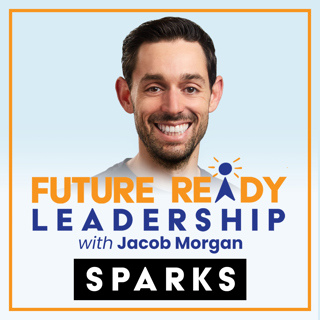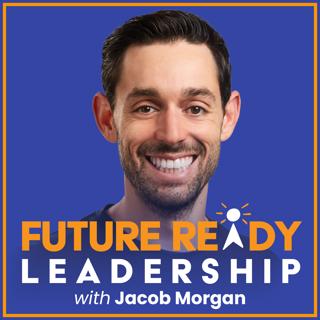
Sparks: Build The Future of Work With The World’s Top CHROs
Future of Work Leaders is a NEW community of the world’s top CHROs who are shaping the future of work and employee experience. Other communities focus purely on traditional HR, are VERY expensive, members are constantly being sold to, and there’s far more fluff than value. Future of Work Leaders is affordable for any CHRO, there’s no selling, no speeches, and no fluff. It’s purely focused on strategy, insight, and connections with world leading CHROs who are shaping the future of work and employee experience. Join 40 members including CHROs from LEGO, Johnson & Johnson, Dow, Tractor Supply, Northrop Grumman, and Neiman Marcus. Check out FutureOfWorkLeaders.com to learn more and request an invite. ________________ Start your day with the world’s top leaders by joining thousands of others at Great Leadership on Substack. Just enter your email: https://greatleadership.substack.com/
14 Feb 14min

Sahil Bloom on Why Success Isn’t Just About Money
Are you chasing the wrong kind of wealth? We all chase success, but too often, it’s tied to money, fame, or career milestones. Sahil Bloom, author of The Five Types of Wealth and creator of the Curiosity Chronicle newsletter, believes that true wealth lies in a balance of time, relationships, health, mental clarity, and financial stability. In today’s episode, Sahil introduces a fresh way to think about success by focusing on these five types of wealth. We explore how to connect your work to your purpose, overcome the trap of overthinking, and use simple frameworks to build deeper connections and more meaningful progress. We’ll unpack Sahil’s transformative insights, including why chasing money without purpose leads to burnout, how to build "social wealth" to combat the loneliness epidemic, the power of questioning cultural norms to find your identity, and how even small actions can create massive compounding effects in life. ________________ Start your day with the world’s top leaders by joining thousands of others at Great Leadership on Substack. Just enter your email: https://greatleadership.substack.com/
10 Feb 51min

Sparks: Are Today’s Leaders Too Afraid? How to Lead With Confidence, Courage, and Respect
Are today’s leaders too afraid to lead? In today's Leadership Spark, we explore the challenges of leadership today, from balancing psychological safety with accountability to being honest about workplace expectations. We discuss how over-coddling employees and focusing too much on feelings can backfire, and why it’s important for leaders to set clear standards while fostering respect and responsibility. ________________ Start your day with the world’s top leaders by joining thousands of others at Great Leadership on Substack. Just enter your email: https://greatleadership.substack.com/
7 Feb 4min

Three Leadership Skills to Thrive in the Future of Work
The secret to better leadership in the future of work isn't knowing everything, but mastering the right things. This episode brings together three leadership visionaries—Diego Barreto, CEO of iFood; Jeff Kindler, former CEO of Pfizer; and Frederic Laloux, author of Reinventing Organizations—to share the tools you need to lead smarter in the new world of work. You'll learn why mastering one skill at a time, encouraging constructive disagreement, and embracing self-management are the keys to navigating uncertainty, driving better decisions, and building agile teams. ________________ Start your day with the world’s top leaders by joining thousands of others at Great Leadership on Substack. Just enter your email: https://greatleadership.substack.com/
3 Feb 55min

Sparks: Employee Engagement Is Not a Long-Term Workplace Solution
Most employees start their journey excited and motivated, but that enthusiasm often fades when organizations rely on perks like yoga or free food to boost engagement. These quick fixes don’t address deeper needs. In today's Leadership Spark, we dig into the critical difference between employee engagement and employee experience, showing how leading companies shift from superficial perks to meaningful workplace transformation. Learn why only 6% of organizations excel in creating environments where employees thrive—and how your company can join them. ________________ Start your day with the world’s top leaders by joining thousands of others at Great Leadership on Substack. Just enter your email: https://greatleadership.substack.com/
30 Jan 8min

Strategies For Effective Mentor and Mentee Relationships At Work
Mentorship is often misunderstood. Many mentees expect their mentors to drive the relationship or solve their problems. But Amy Salcido, President of Kyndryl U.S., shows us a different take on how to do mentorship right. In today’s episode, Amy shares her unique insights from leading a team of 16,000 employees in one of the world’s largest IT infrastructure companies. Amy unpacks the lessons she learned at IBM, where mentorship was pivotal in her rise to executive leadership. She explains why mentorship fails without proactive mentees taking responsibility for their own growth, how authenticity accelerates leadership success, and why the best mentors don’t give you answers—they guide you to find them yourself. We also tackle the surprising benefits of focusing on passions instead of job titles and how to structure effective mentor-mentee relationships in any organization. ________________ Start your day with the world’s top leaders by joining thousands of others at Great Leadership on Substack. Just enter your email: https://greatleadership.substack.com/
27 Jan 1h 1min

Sparks: The Vulnerability Wheel and How Vulnerability Can Be Used For and Against Your Favor
Have you ever wondered if vulnerability could backfire? Leaders often face tough decisions about when and how to be open, and the stakes are high when trust is involved. In today's Leadership Spark, we explore a powerful story about a CEO who learned hard lessons about vulnerability after it was used against her early in her career. You'll hear insights on navigating trust, why vulnerability is essential for leadership, and how self-compassion can be your safety net when things go wrong. This episode also introduces the "Vulnerability Wheel" framework to help leaders use vulnerability effectively. ________________ Start your day with the world’s top leaders by joining thousands of others at Great Leadership on Substack. Just enter your email: https://greatleadership.substack.com/
24 Jan 5min

How Lumen CEO Kate Johnson Changed the Culture of a Billion-Dollar Company From Playing Not to Lose to Playing to Win
Turning around a struggling company isn’t for the faint of heart, but Kate Johnson, CEO of Lumen Technologies, is proving it can be done—and done well. Leading 30,000 employees and steering billions in revenue, Kate is tackling one of the toughest challenges in business: shifting a telecom giant from “playing not to lose” to “playing to win.” In this episode, Kate opens her fresh and fearless playbook on what it really takes to transform a culture: it starts with clarifying your mission and getting everyone aligned. She shares bold, practical strategies like fostering trust, teaching resilience, and encouraging courageous conversations that push teams forward, not sideways. We’ll also unpack why most leaders fail at culture change (and it’s not for lack of trying), how to break silos by getting close to the action, and the non-negotiables for any leader’s first 100 days. If you’re ready to rethink what it means to lead and create a culture that wins, you don’t want to miss this one. ________________ Start your day with the world’s top leaders by joining thousands of others at Great Leadership on Substack. Just enter your email: https://greatleadership.substack.com/
20 Jan 1h






















